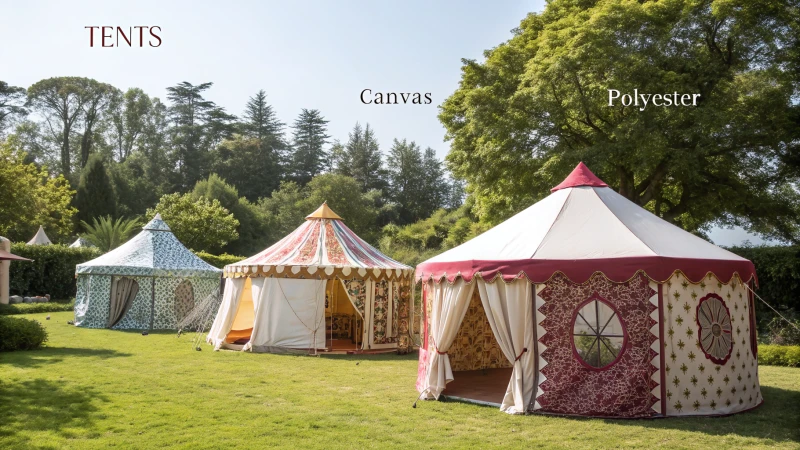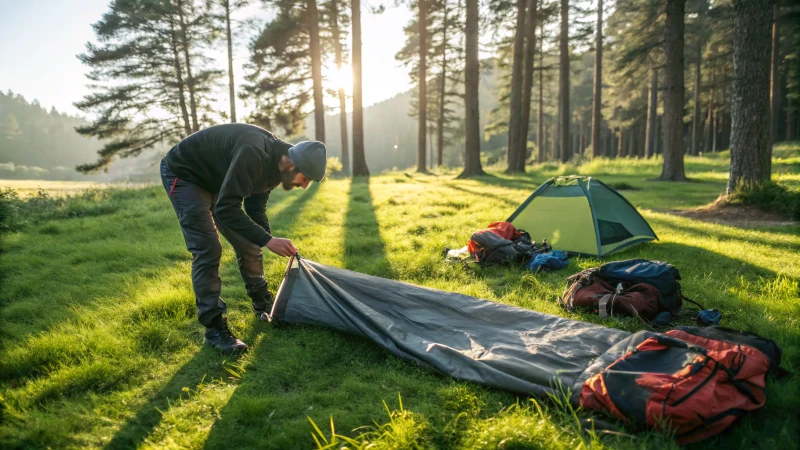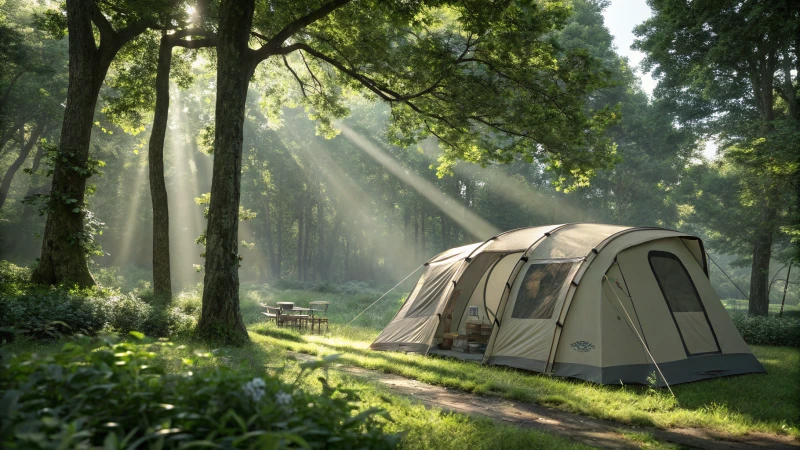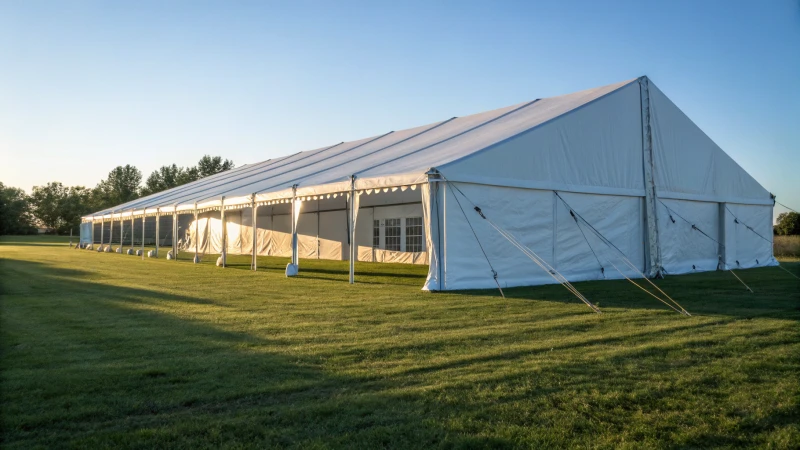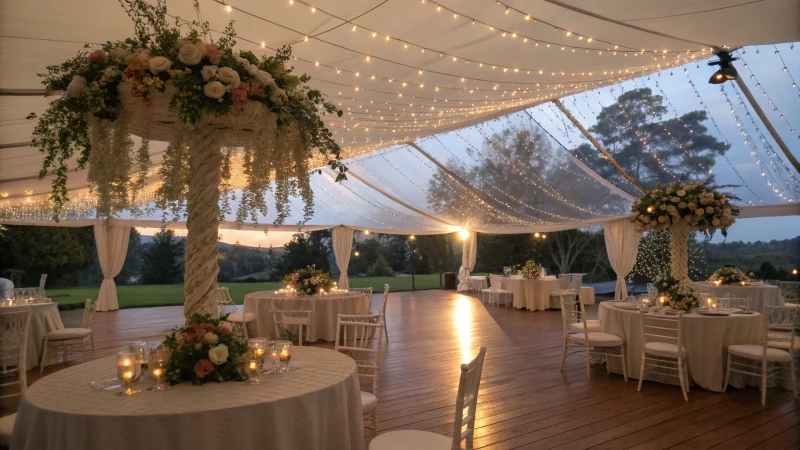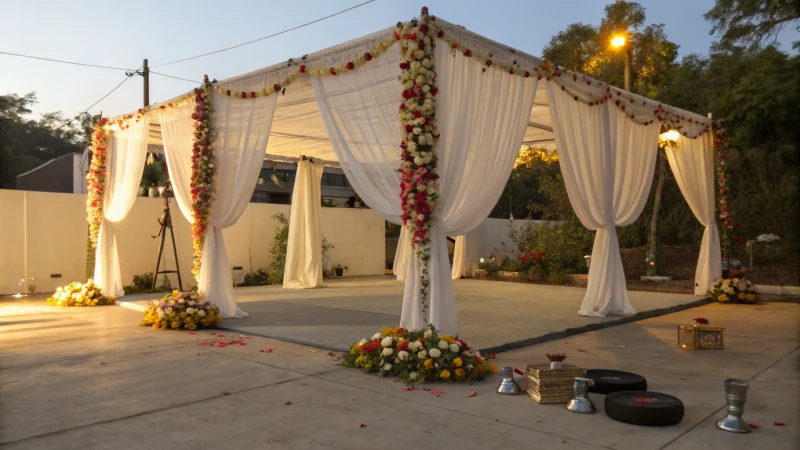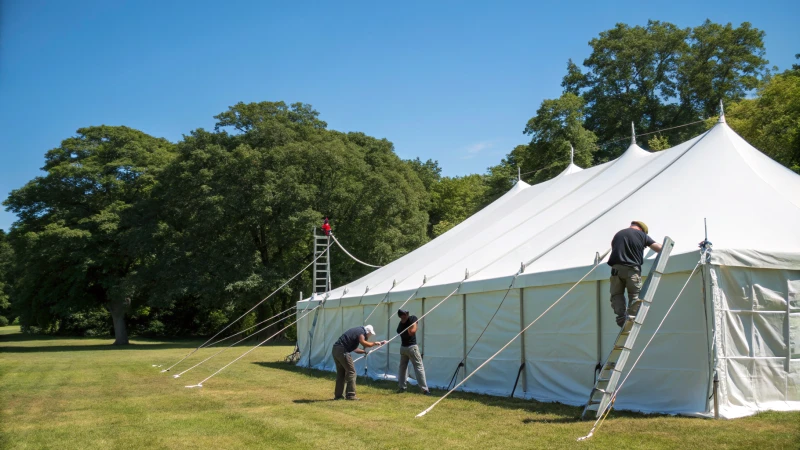
Remember that time when I tried to set up a large tent by myself? Let me tell you, it was an experience!
Professional installation services for large tents are crucial for ensuring safety, adhering to regulations, and achieving an efficient setup, particularly with complex or substantial structures.
Back when I attempted a DIY tent setup for an event, I quickly realized the sheer complexity involved. Balancing poles, managing stakes, and ensuring the structure was sound was no small feat. That’s when it hit me—the importance of professional installation. These experts not only have the skills but also the right tools and techniques to handle even the trickiest tent setups. Their proficiency means everything is done swiftly and safely, leaving me stress-free and confident about the event’s success. If you’re planning a significant event, trusting professionals might just be the smartest move.
DIY tent setups are always unsafe for large events.False
With proper knowledge and tools, DIY setups can be safe for some events.
Professional tent installers ensure compliance with regulations.True
Experts are familiar with local regulations, ensuring legal compliance.
Why Choose Professional Tent Installation?
Imagine transforming an open space into a breathtaking venue with just one call. That’s the magic of professional tent installation.
Professional tent installation ensures safety, efficiency, and customization. Experts secure tents to meet safety standards and offer tailored solutions for complex events, minimizing risks and maximizing success.
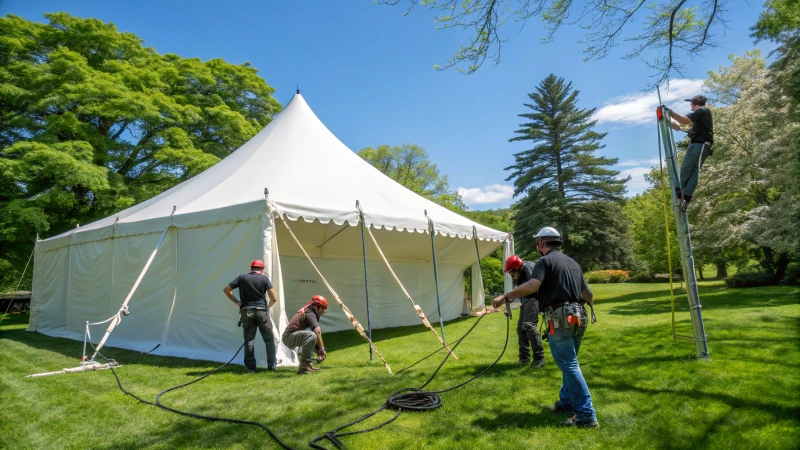
Safety and Compliance
When I think back to my first major event, safety was my top concern. The last thing anyone wants is for a gust of wind to turn a celebration into chaos. Professional installers have this innate knack for reading the weather and ground like a seasoned captain reads the sea. They ensure every tent stands strong, come rain or shine, adhering to all the local safety standards1. This isn’t just about peace of mind—it’s about ensuring your guests can enjoy themselves without worry.
| Safety Feature | Benefit |
|---|---|
| Structural Integrity | Withstands adverse weather conditions. |
| Proper Anchoring | Prevents tent movement or collapse. |
| Compliance | Adheres to safety regulations and codes. |
Expertise and Efficiency
I’ll never forget the time I attempted a DIY tent setup for a small event. It took all day, and I ended up with a lopsided tent that sagged in places it shouldn’t have. Professionals bring their A-game with specialized tools and knowledge that make the setup process look like a well-choreographed dance. They handle unexpected hiccups—like uneven ground or surprise weather changes—with ease, saving you time and potential headaches.
Additionally, experienced teams can troubleshoot unforeseen issues, such as uneven terrain or unexpected weather, which might arise during the installation process.
Customization Opportunities
One of the most exciting aspects of hiring professionals is watching them transform your vision into reality. Whether you’re dreaming of an elegant wedding under twinkling lights or a corporate event with distinct zones, experts can tailor every detail.
- Tailored Layouts: Accommodate stages, seating arrangements, or specialized equipment.
- Add-Ons: Include extras like flooring, lighting, HVAC systems, and decor.
Risk Reduction
I’ve learned the hard way that ignoring professional advice can lead to disasters. Imagine your event getting interrupted because of a tent mishap—it’s not just embarrassing; it’s potentially dangerous. Professionals anticipate challenges and proactively address them to prevent such scenarios.
Consider what could happen if an amateur installation results in a tent collapse during your event. The consequences could be severe—injuries, damage, and reputation loss. By hiring experts, you largely avoid these risks.
Why Professionals Are Essential for Large-Scale Events
In my experience with large events like weddings or corporate functions, precision is everything. The margin for error is slim when you’re on a tight schedule and aiming for perfection. Professional installers bring a level of assurance that’s hard to quantify but easy to appreciate when you see everything come together beautifully.
For anyone planning an event with complex requirements or time constraints, hiring experts can be the smartest choice. Their services often include comprehensive packages that cover all aspects of the tent setup process, providing peace of mind and allowing event organizers to focus on other important details.
Explore more about customized large tents2 to suit your event needs. Whether it’s an Arcum tent for corporate events or a pagoda for a more intimate gathering, understanding the benefits of professional installation can be transformative in planning your next outdoor event.
Professional tent installers comply with safety standards.True
They adhere to local safety regulations and building codes.
DIY tent installations are safer than professional setups.False
Professional installations reduce risks with advanced techniques and tools.
When Is DIY Tent Installation Feasible?
Thinking about pitching a tent all by yourself? Before you dive in, it’s good to know when DIY tent installation is a smart move and when it might be best to call in the pros.
DIY tent installation is ideal for small tents under 500 square feet with simple designs, especially on flat terrain. Make sure you have essential tools like stakes and ladders, and always prioritize safety guidelines.
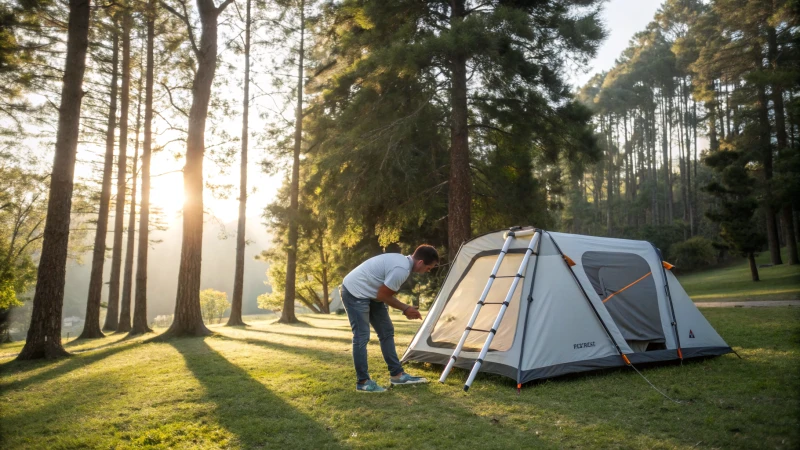
Understanding Tent Sizes
I remember the first time I decided to set up a tent for a family backyard gathering. The tent was just under 500 square feet, a perfect fit for our space. It was manageable and didn’t require more than a couple of helping hands. For smaller events or family get-togethers, these tents are perfect because they don’t need a professional team or complex equipment.
| Tent Size | Feasibility | Notes |
|---|---|---|
| Under 500 sq ft | DIY Possible | Simple design; easier setup |
| 500-1000 sq ft | Maybe DIY | Requires a small team |
| Over 1000 sq ft | Professional Recommended | Complex structures |
Terrain Considerations
Once, I tried setting up a tent on uneven ground during a camping trip. Boy, was that an adventure! Flat terrain makes things so much easier. Avoid areas with dense vegetation or sloping land unless you’re ready for a challenge. It’s these little things that can make or break the ease of your DIY setup. Considerations for tent setup3 may include:
- Ground type
- Accessibility
- Weather conditions
Essential Tools and Skills
The right tools can turn a potential disaster into a smooth setup experience. I learned this the hard way when I first forgot a mallet to hammer in stakes—talk about frustrating! Make sure your toolkit includes ladders, tensioning tools, stakes, and anchors. Basic construction skills will definitely come in handy. You can find more tips by consulting resources on tent installation4.
Cost Implications
Initially, I thought DIY would always be the cheaper option until I had to deal with repairs from a poorly installed tent that was damaged in a sudden storm. Weigh the potential savings against possible risks. Sometimes professional services, with their warranties and insurance, save you more in the long run.
Safety Considerations
Above all, safety is paramount. I’ve had nights where I didn’t sleep well because I was worried about the tent’s stability in windy conditions. Always follow safety standards, double-check your anchoring methods, and review the structural integrity of your setup. Checking out safety protocols5 is always a good idea.
Taking the time to evaluate these factors can help you decide if DIY tent installation is right for you and ensure that your event or camping trip goes off without a hitch.
DIY tent setup is feasible for tents under 500 sq ft.True
Smaller tents are manageable and suitable for DIY installation.
Professional help is unnecessary for tents over 1000 sq ft.False
Larger tents require expertise and more hands-on assistance.
How Do Professionals Ensure Tent Safety and Compliance?
Ever wonder how those massive event tents stay secure and safe? It’s all about the pros behind the scenes.
Professionals ensure tent safety by strictly following local building codes, using precise anchoring techniques, and leveraging specialized tools. Compliance is achieved through thorough inspections and adherence to regulations.
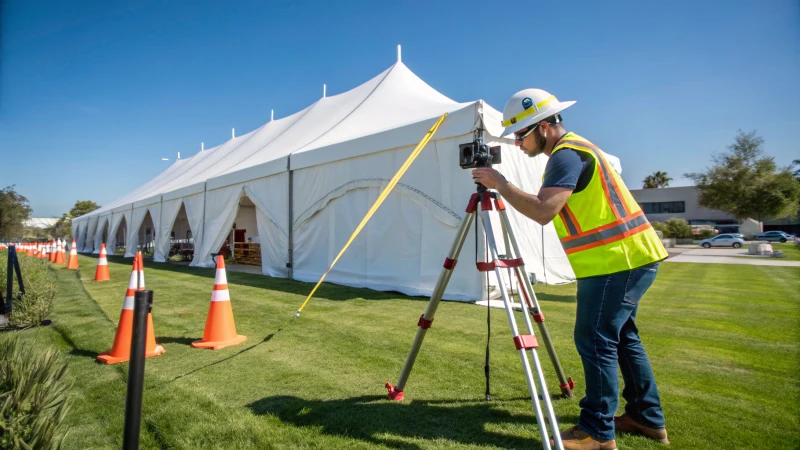
Understanding Local Regulations
You know, when I first started out in the tent business, I was surprised by just how many regulations there were. Ensuring tent safety isn’t just about making sure it doesn’t blow away—it’s about knowing and adhering to local building codes6. This means getting the right permits and meeting all the structural requirements, which is crucial for peace of mind.
Importance of Proper Anchoring
The first time I saw a tent almost take flight due to poor anchoring, I realized how vital this aspect is. Professionals like us assess the ground type and weather conditions to choose the right method—be it stakes, ballast, or ground screws. Trust me, nothing beats the satisfaction of seeing a tent standing firm against a gusty wind!
| Anchoring Method | Suitable Ground Type | Additional Considerations |
|---|---|---|
| Stakes | Soft soil | Requires depth assessment |
| Ballast | Hard surfaces | Weight distribution |
| Ground Screws | Mixed terrains | Special equipment needed |
Specialized Tools and Equipment
Let me tell you, setting up a complex tent is like assembling a giant Lego set. We use advanced tools like lifts and pulleys to ensure everything fits together perfectly. It’s amazing how these tools make even the most challenging setups feel like a breeze.
Conducting Thorough Inspections
I remember once being caught off guard by a small oversight during an inspection, and since then, I’ve learned to never skip this step. Professionals conduct both pre-installation site checks and post-setup inspections to catch potential hazards or structural issues. It’s all about safety first.
Training and Expertise
My team and I have seen it all—from uneven terrains to unexpected storms. Our expertise allows us to anticipate these challenges and implement preventive measures effectively. It’s this experience that ensures your tent not only looks good but is also safe.
Ensuring Weather Preparedness
Weather can be unpredictable, but with our proactive approach—monitoring forecasts and adding support structures as needed—we minimize risks. I remember a time when an unexpected storm hit, but thanks to our preparation, the event went on without a hitch.
Risk Mitigation Strategies
Reducing risk is about foresight. Incorrect installation can spell disaster, so we’ve trained hard to avoid common mistakes. By understanding the multifaceted approach professionals take towards ensuring tent safety and compliance, it becomes clear why hiring experts is often recommended for large-scale events. Learn more about these processes7 to make informed decisions for your event needs.
Proper anchoring prevents tent collapse.True
Correct anchoring methods stabilize tents, preventing collapse in adverse conditions.
Ignoring local codes is acceptable for tent setup.False
Adhering to local building codes is essential for ensuring tent safety and compliance.
What Costs Are Involved in Professional Tent Installation Services?
Ever found yourself pondering over the costs of setting up a tent for a big event?
Professional tent installation costs depend on factors like tent size, complexity, location, and added features like lighting or flooring. These typically cover labor, equipment rental, and transport. Engaging with service providers helps you get a precise quote.
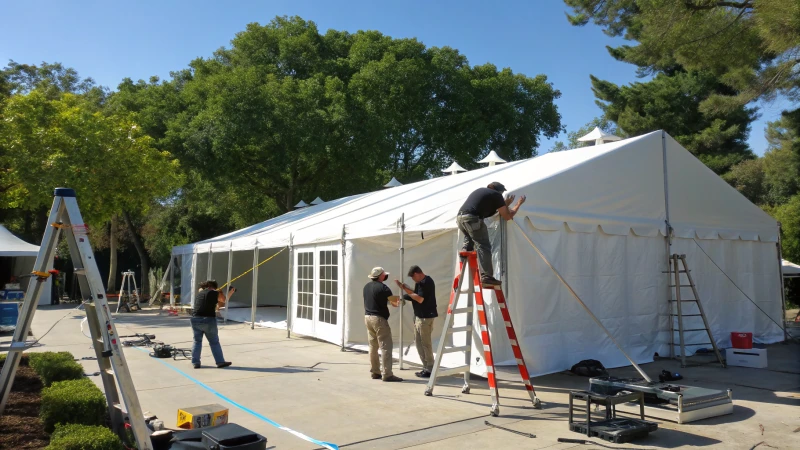
Factors Affecting Tent Installation Costs
1. Tent Size and Type
If you’ve ever tried to set up a tent yourself, you know that size matters. Larger tents demand more hands on deck and specialized skills. Picture a grand wedding tent8 with intricate layouts—it’s like organizing a small city under canvas.
2. Location and Accessibility
Some sites are tricky. I once had to set up a tent on a beach, and let me tell you, that sandy terrain required extra equipment and planning, which added to the bill. Remember, remote or uneven locations might mean extra fees.
| Location Type | Additional Costs |
|---|---|
| Beach | Higher due to sand |
| Uneven Terrain | Extra equipment needed |
3. Labor Costs
The expertise of skilled technicians is invaluable—they’re fast, efficient, and ensure everything stands firm. Naturally, larger setups need more crew members. I’ve noticed labor rates can fluctuate based on whether you’re in a bustling city or out in the countryside.
| Region | Estimated Labor Cost |
|---|---|
| Urban Areas | $60 – $100 per hour |
| Rural Locations | $40 – $80 per hour |
4. Equipment and Tools
Specialized tools are like the magic wand for tent installations—lifts, pulleys, and ground screws ensure everything is secure but add to the expenses.
5. Additional Services
Then there are the little extras that make an event memorable. From stunning lighting to comfy flooring or even HVAC systems for those sweltering summer weddings, these add-ons9 can transform your tent but will also bump up the price.
Estimating Your Costs
Getting a grip on costs means shopping around for detailed quotes from various providers. I’ve learned that asking for specific quotes based on tent size or any tricky location challenges can really help fine-tune your budget.
- Tent Size: It pays to compare quotes for different sizes.
- Location Challenges: Address potential site issues right from the start.
- Extras: Decide if those add-ons are crucial for your event’s vibe.
Weighing these estimates helps guarantee you get the best bang for your buck, ensuring your event kicks off without any nasty surprises. For more nitty-gritty details on pricing, it’s worth reaching out to local providers or diving into relevant blogs10.
Tent size directly impacts installation costs.True
Larger tents require more resources and manpower, increasing costs.
Urban areas have lower labor costs than rural locations.False
Urban areas typically have higher labor rates due to demand.
Conclusion
Professional installation services for large tents ensure safety, compliance with regulations, and efficient setup, making them essential for successful events and minimizing risks associated with DIY installations.
-
Understanding compliance with safety standards ensures your event tent is safe and legally sound. ↩
-
Explore options for customizing tents to meet specific event needs and enhance guest experience. ↩
-
Understanding terrain considerations can prevent installation challenges and ensure your tent remains secure in varying environments. ↩
-
Learn about the tools needed to efficiently and safely install a tent on your own. ↩
-
Ensure you’re following best practices to avoid accidents or damages during your tent setup. ↩
-
Discover specific local building codes that professionals follow to ensure tent installations meet safety standards. ↩
-
Explore comprehensive processes that professionals use to ensure tents are safe and compliant. ↩
-
Explore typical costs associated with wedding tent setups to gauge your budget accurately. ↩
-
Learn about optional services like lighting and flooring that can enhance your event’s atmosphere. ↩
-
Read comprehensive blog posts offering detailed breakdowns of installation costs. ↩


